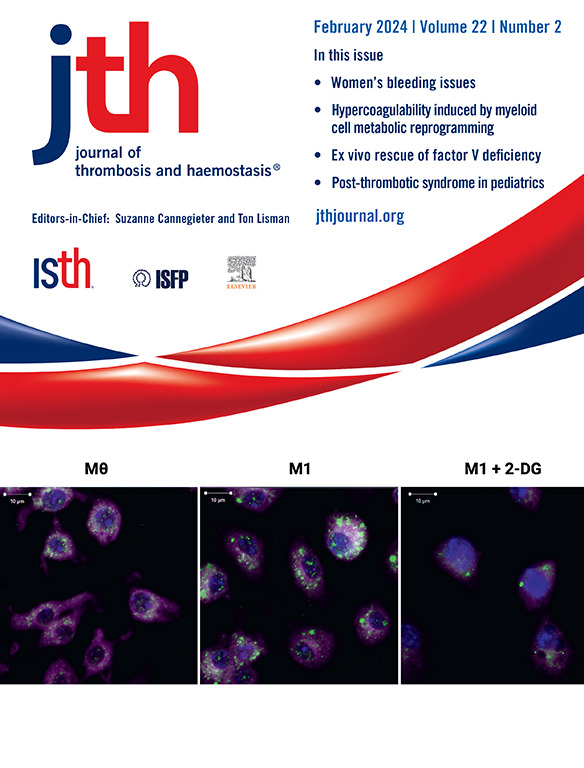持续存在的脾脏衍生 IgM 可优先识别因子 VIIIA2 和 C2 结构域表位,但不会改变抗体的产生。
IF 5.5
2区 医学
Q1 HEMATOLOGY
引用次数: 0
摘要
背景:A 型血友病患者在治疗过程中最主要的并发症是产生针对 VIII 因子 (FVIII) 的中和免疫球蛋白 G (IgG),即抑制剂,从而阻碍 FVIII 替代治疗。在有抑制剂和无抑制剂的 A 型血友病患者以及健康人中都发现了低滴度的 FVIII 特异性免疫球蛋白 M (IgM)。然而,IgM 对 FVIII 免疫反应的持续时间和影响仍不清楚:目的:描述 A 型血友病小鼠体内持续分泌的 FVIII 特异性 IgM 的结合相互作用,并评估其对 IgG 抗体形成的影响:方法:利用杂交瘤技术分离和纯化免疫FVIII基因敲除小鼠脾源性单克隆抗体(MAbs)。利用新型液相酶联免疫吸附试验(ELISA)和 HADDOCK 计算模型对结合相互作用进行评估,以考虑弱 IgM 结合:结果:共鉴定出 16 种猪交叉反应性和非抑制性 FVIII 特异性 IgM MAbs。FVIII特异性IgM的RNA测序发现了13个独特的VDJ/VJ序列,表明其来源于13个独特的B细胞克隆。IgM 与 FVIII 在体外和硅学中表现出多克隆和多反应结合。与重建的 IgM VDJ/VJ 区域进行的分子对接研究发现,IgM 与 FVIII A2 和 C2 结构域内的 K376、T381、K437、R2215 或 K2249 氨基酸残基经常发生相互作用。在暴露于 FVIII 之前注射单个 IgM 和联合注射 FVIII/IgM 免疫复合物不会影响新生 FVIII 抗体的产生:结论:持续存在的 FVIII 特异性 IgM 是多克隆的,但优先结合 A2 和 C2 结构域,FVIII/IgM 免疫复合物的形成不会显著改变抑制剂的产生。本文章由计算机程序翻译,如有差异,请以英文原文为准。
Persistent splenic-derived IgMs preferentially recognize factor VIII A2 and C2 domain epitopes but do not alter antibody production
Background
The most significant treatment complication for patients with hemophilia A is the development of neutralizing immunoglobins (Igs) G, termed inhibitors, against factor VIII (FVIII), which prevent FVIII replacement therapy. Low titers of FVIII-specific IgMs have been identified in hemophilia A patients with and without inhibitors, as well as in healthy individuals. However, the duration and influence of IgMs on the immune response to FVIII remains unclear.
Objectives
To characterize the binding interactions of persistently secreted FVIII-specific IgMs in hemophilia A mice and assess their effect on IgG antibody development.
Methods
Splenic-derived monoclonal antibodies (mAbs) from immunized FVIII knockout mice were isolated and purified using hybridoma technology. Binding interactions were assessed utilizing a novel fluid-phase enzyme-linked immunosorbent assay and computational modeling with High Ambiguity-Driven protein-protein DOCKing to account for weak IgM binding.
Results
Sixteen porcine cross-reactive and noninhibitory FVIII-specific IgM mAbs were identified. RNA sequencing of FVIII-specific IgMs revealed 13 unique variable, diversity, and joining (VDJ)/variable and joining (VJ) sequences indicating derivation from 13 unique B cell clones. The IgMs demonstrated polyclonal and polyreactive binding to FVIII in vitro and in silico. Molecular docking studies with reconstructed IgM variable, diversity, and joining/variable and joining regions identified frequent IgM interactions with amino acid residues K376, T381, K437, R2215, or K2249 within the FVIII A2 and C2 domains. Injections of individual IgMs prior to FVIII exposure and co-injection of FVIII/IgM immune complexes did not affect de novo FVIII antibody production.
Conclusion
Persistent FVIII-specific IgMs are polyclonal but preferentially bind the A2 and C2 domains. FVIII/IgM immune complex formation does not significantly alter inhibitor development.
求助全文
通过发布文献求助,成功后即可免费获取论文全文。
去求助
来源期刊
CiteScore
24.30
自引率
3.80%
发文量
321
审稿时长
1 months
期刊介绍:
The Journal of Thrombosis and Haemostasis (JTH) serves as the official journal of the International Society on Thrombosis and Haemostasis. It is dedicated to advancing science related to thrombosis, bleeding disorders, and vascular biology through the dissemination and exchange of information and ideas within the global research community.
Types of Publications:
The journal publishes a variety of content, including:
Original research reports
State-of-the-art reviews
Brief reports
Case reports
Invited commentaries on publications in the Journal
Forum articles
Correspondence
Announcements
Scope of Contributions:
Editors invite contributions from both fundamental and clinical domains. These include:
Basic manuscripts on blood coagulation and fibrinolysis
Studies on proteins and reactions related to thrombosis and haemostasis
Research on blood platelets and their interactions with other biological systems, such as the vessel wall, blood cells, and invading organisms
Clinical manuscripts covering various topics including venous thrombosis, arterial disease, hemophilia, bleeding disorders, and platelet diseases
Clinical manuscripts may encompass etiology, diagnostics, prognosis, prevention, and treatment strategies.

 求助内容:
求助内容: 应助结果提醒方式:
应助结果提醒方式:


